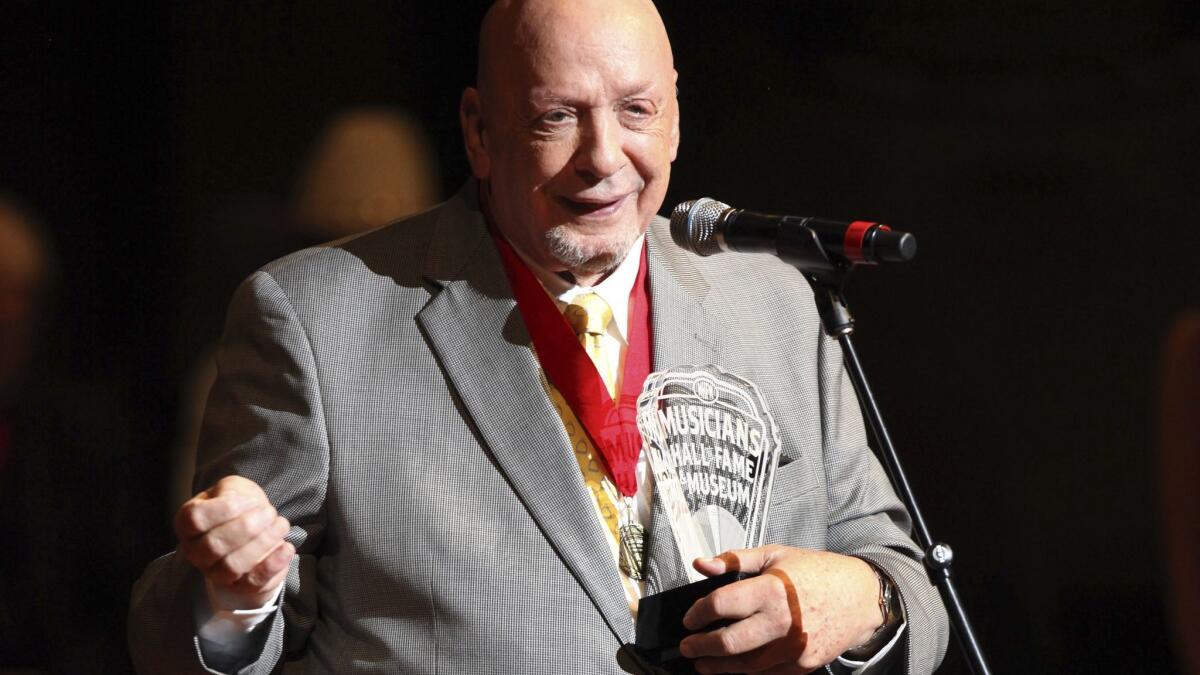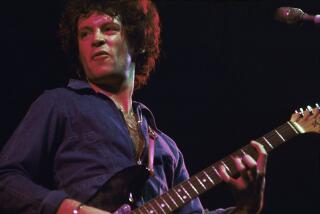Fred Foster, producer who made Dolly Parton and Roy Orbison global stars, dies at 87

Nashville producer Fred Foster, who produced some of Roy Orbison’s most popular records and was the first to spot the extraordinary talents of Kris Kristofferson and Dolly Parton, has died. He was 87.
Foster died Wednesday in Nashville, according to Martha Moore, his publicist.
Foster, who was born in 1931 in North Carolina, helped launch the careers of many hit country artists and was a major supporter of some of Nashville’s biggest songwriters. He also worked with artists such as Tony Joe White, Willie Nelson, Charlie McCoy and Jeannie Seely.
In the 1960s, he moved his record label, Monument Records, from Washington, D.C., to Nashville.
Foster was the first to see the potential in a young singer-songwriter from East Tennessee named Dolly and got her songs cut by other artists, as well as recording and releasing her own material. But it wasn’t until she started appearing on Porter Wagoner’s TV show that she became popular.
“I am heartbroken that my friend Fred Foster has passed on,” Parton said in a statement Thursday. “Fred was one of the very first people to believe in me and gave me chances no one else would or could. We’ve stayed friends through the years and I will miss him. I will always love him.”
Foster said he took pride in the ability to spot “something unique in somebody.”
“Anybody who dropped a needle on a groove of a Monument record, I wanted them to immediately know, ‘Oh, that’s Dolly Parton,’ or ‘That’s Roy Orbison.’ It had to be unique,” he said.
Foster also owned a publishing company, Combine Music, and Kristofferson was one of his hires, a Texas-born athlete and Army veteran who loved William Blake. He had been trying to break through as a songwriter, even working as a janitor in a Music Row recording studio. After hearing some of his songs, Foster said he would hire Kristofferson as a songwriter only if he also signed a record deal.
“He was so intelligent, so gifted, so talented and he didn’t sound like anybody I had ever heard,” Foster said in 2016, the same year Foster was inducted into the Country Music Hall of Fame.
Foster is credited as co-writer on Kristofferson’s hit song “Me and Bobby McGee.” Foster came up with the idea to name a song after a female secretary in his building, whose name was Bobbie McKee. Kristofferson told Performing Songwriter magazine that he was inspired to write the lyrics about a man and woman on the road together after watching the Federico Fellini film “La Strada.”
Janis Joplin, who had a close relationship with Kristofferson, changed the lyrics to make Bobby McGee a man and cut her version just days before she died in 1970 from a drug overdose. The recording became a posthumous No. 1 hit for Joplin.
In the early 1960s, Foster helped Orbison become an international star with his recordings on Monument. Orbison was an unlikely rock ’n’ roller with his falsetto and penchant for wearing dark sunglasses and black suits. His singles were dark and emotional, backed by soaring strings and doo-wop backing vocals. Some of the classic Orbison songs released by Monument include “Only the Lonely,” “Oh, Pretty Woman” and “Crying.”
“Oh, Pretty Woman” sold more than 7 million copies in 1964 and earned Orbison his first Grammy nomination for rock ’n’ roll recording.
Foster continued to work as a producer throughout his life, never really slowing down. He produced “Last of the Breed,” a 2007 collaborative album between Ray Price, Merle Haggard and Nelson that resulted in a Grammy win for Price and Nelson for country collaboration with vocals. At 85, he worked on a Price tribute album for Nelson, called “For the Good Times,” that was released in 2016.
“If I don’t know more at 85 than I did at 75, I am not learning very fast, am I?” Foster said at the time. “I think I’m probably a better producer today than I have ever been.”
More to Read
Start your day right
Sign up for Essential California for the L.A. Times biggest news, features and recommendations in your inbox six days a week.
You may occasionally receive promotional content from the Los Angeles Times.






